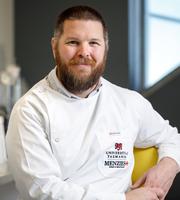Acute lung injury and acute respiratory distress syndrome claim more than 3000 Australian lives each year and have mortality rates of approximately 30 per cent.
Help is
potentially at hand through mechanical ventilation, but the barrier to this
treatment is that the optimum level of ventilation is not known. Without the
correct ventilation level, this treatment is catastrophic.
Professor Graeme Zosky, who is a Deputy Director at the Menzies Institute for Medical Research and a respiratory physiologist in the School of Medicine, will attempt to fill this critical gap in knowledge with a $732,607 NHMRC grant to investigate the mechanisms linking mechanical ventilation with organ failure.
The insight gained from this study will help improve outcomes in patients suffering from respiratory failure
“While mechanical ventilation is potentially life-saving, optimum ventilation settings are not yet known and this means that intervention often results in lung damage which leads to other organs failing as well," Professor Zosky said.
In this study we will use state-of-the-art imaging techniques and experimental models to investigate the mechanisms that link mechanical ventilation with organ failure.
Professor Zosky has built a successful research career in Western Australia and Tasmania around better understanding of the mechanics of how our lungs function.
His research is clinically relevant in a multitude of ways.
“Respiratory infection is the most common reason that young children are hospitalised,” he said. “Without knowing more about lung physiology we can’t improve the health of these children.”
I’d like to think that we can get to the stage where everyone has an equal start to life in terms of their respiratory health.
Professor
Zosky collaborates with critical care specialists at the Royal Hobart Hospital
and has experience in the early life determinants of respiratory disease,
including post-natal and in-utero exposures. He has also worked on occupational
exposures such as coal dust and on other influences on lung health such as
vitamin D and arsenic.
Interested in conducting your own research? Apply now to become a research student.
